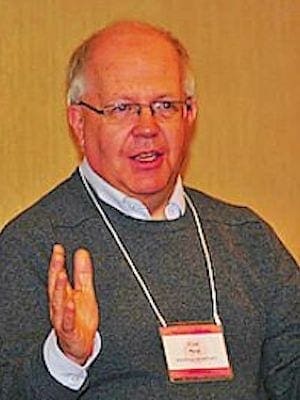It was just a few years ago that I encountered for myself the horror that is simply known to the world as Srebrenica.
With the leader of the Baptists in Bosnia-Herzegovina, I travelled to Portacari just outside Srebrenica, now in the Republika Srpska, the semi-autonomous Serb province of the country.
There we saw the neat rows of thousands of green markers in a Muslim graveyard – just some of the estimated 8,000 Bozniak (Bosnian Muslim) men and boys systematically murdered in a few days in July 1995 as part of the horrific ethnic cleansing perpetrated by the Milosevic regime.
To stand there for just a few minutes was to sense the enormity of the crime against humanity that took place here.
On the other side of the road is the eerily deserted factory, which still has the sign “Dutchbat” painted on its entrance.
This was the headquarters of the U.N. Dutch Battalion, which was supposed to provide protection for the Bozniaks in a safe area.
But in the end, and this continues to provoke controversy, they were powerless to stop the murderous intent of the Serb forces headed up by Gen. Mladic, who is now awaiting judgment in the International Criminal Court in The Hague.
Across the former Yugoslavia in the early 1990s, in places where Christians and Muslims had lived side by side in peace for centuries, the rhetoric and politics of hate and nationalism took hold and led to civil war, violence and bloodshed, especially in Croatia, Bosnia and Kosovo.
And there is no doubt that these ethnic conflicts, including the one in Bosnia, had a deeply religious dimension to them.
As we can see in the present situation in Russia, the national “autocephalous” Orthodox churches are prone to getting behind extreme nationalist rhetoric and policies and appearing to “baptize” and bless them.
It is well documented that this happened with the leadership of the Serbian Orthodox Church in the 1990s, and there is also evidence of support from the leaderships of other Orthodox churches
This was also the era of the “clash of civilizations” view of world order, put forward by Samuel Huntingdon and others but now discredited in many quarters.
This so easily became the basis for stoking the idea of inevitable conflict between “Christian civilization” and Islam.
One of the most disturbing aspects of the massacre at Srebrenica is that the buildup to the massacre, and even some of the killings themselves were filmed because there were cameramen with the Serb Forces and also with the U.N. battalion.
There is a chilling moment that is recorded on film when Gen. Mladic invokes a Serbian Orthodox saint to give legitimacy for what he is about to do to the Bozniaks, which is, he says, to take revenge on the great defeat of the Serbian Christians at the hands of the Ottoman Turks at the Battle of Kosovo in 1389.
The Quaker, Michael Sells, in his book, “The Bridge Betrayed: Religion and Genocide in Bosnia,” concludes, “The violence in Bosnia was a religious genocide in several senses: the people destroyed were chosen on the basis of their religious identity; those carrying out the killings acted with the blessing and support of Christian church leaders; the violence was grounded in a religious mythology that characterized the targeted people as race traitors and the extermination of them as a sacred act.”
Sells also refers to “the silence of the self-identified Christian leaders in many parts of the world,” and there was criticism at the time of the lack of clear condemnation by the World Council of Churches, which some saw as being too concerned to keep good relations with its member Orthodox churches.
And what of Baptist responses?
The European Baptist Federation and the Baptist World Alliance were very active in supporting victims of the Balkans conflicts through the churches. But I can find no mention in any resolution or press release at the time of condemnation of the Srebrenica massacre, the worst act of genocide since World War II.
Was there a general reluctance among the churches of all denominations to speak out because the victims were Muslims, I wonder?
A few years ago when I visited Bosnia, I made two other observations.
One was that the ethnic cleansing had sadly been effective – Srebrenica, once home to a mix of Christians and Muslims, is now populated almost entirely by Bosnian Serbs.
The other is a small sign of hope for the future. Before visiting Srebrenica, I had been welcomed as a guest at a Serbian Orthodox monastery, where I was invited to share in one of their feast days.
The abbot was one of a new generation of leaders, trained in France and lacking in the nationalist rhetoric and anti-Islamic sentiments of his immediate forebears.
As we shook hands to leave, he turned to Tomislav, our Baptist leader in Bosnia, and said, “Make sure you take him to Srebrenica.”
Tony Peck is general secretary of the European Baptist Federation. You can follow him on Twitter @EBFGS and EBF @EBFNews.
Editor’s note: This article is part of a series focused on genocide for Genocide Awareness and Prevention Month (April). An introduction to and overview of the series is available here.
The first article in the series is:

